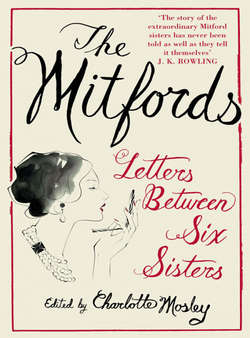Читать книгу The Mitfords: Letters between Six Sisters - Charlotte Mosley - Страница 4
BIOGRAPHICAL NOTES
ОглавлениеNANCY (28 November 1904–30 June 1973) ‘Naunce(ling)’, ‘The Old French Lady’, ‘The Lady’, ‘Dame’, ‘Susan’, ‘Soo’.
Married to Peter Rodd, 1933–58. No children. Studied briefly at the Slade School of Art before embarking on a writing career with Vogue and The Lady. Worked in London at Heywood Hill bookshop during the war. Fell in love with Free French officer Gaston Palewski in 1942, moved to Paris in 1946 to be near him and remained in France, an ardent Francophile, for the rest of her life. Flirted with socialism and fascism before becoming a staunch Gaullist after meeting Palewski. Achieved fame with her post-war novels and repeated the success with four historical biographies. Author of the novels Highland Fling (1931), Christmas Pudding (1932), Wigs on the Green (1935), Pigeon Pie (1940), The Pursuit of Love (1945), Love in a Cold Climate (1949), The Blessing (1951) and Don’t Tell Alfred (1960), and of the historical biographies Madame de Pompadour (1954), Voltaire in Love (1957), The Sun King (1966) and Frederick the Great (1970). Editor of a collection of letters of nineteenth-century Mitford cousins, The Ladies of Alderley (1938) and The Stanleys of Alderley (1939), and of a volume of essays and journalism, The Water Beetle (1962). Her notorious article on ‘U and Non-U’ (upper-and non-upper-class usage) in Encounter magazine (1954) was reprinted in Noblesse Oblige (1956).
PAMELA (25 November 1907–12 April 1994) ‘Pam’, ‘Woman’, ‘Woo’, ‘Wooms’, ‘Woomling’.
Down-to-earth in her tastes and interests, she was a superb cook and happiest living in the country in the company of her dogs. From 1930 to 1934, she managed the farm at Biddesden in Wiltshire for Diana’s first husband, Bryan Guinness. Married to physicist Professor Derek Jackson, 1936–51. No children. When married, she lived at Rignell House, Oxford, before moving to Tullamaine Castle, Ireland, in 1947. In 1963, she settled in Zurich and shared her life with two women, Giuditta Tommasi and Rudi von Simolin. Returned to England in the mid-1970s to live at Woodfield House in Gloucestershire, which she had bought in 1960. She became an acknowledged expert on rearing poultry. Entertained the idea of writing a cookbook but never found time to finish it.
DIANA (17 June 1910–11 August 2003) ‘Cord(uroy)’, ‘Bodley’, ‘Honks’, ‘Nard(y)’.
The acknowledged beauty of the family. Married to Bryan Guinness, 2nd Baron Moyne, 1929–34. Two sons, Jonathan and Desmond. Married fascist leader Sir Oswald Mosley in 1936. Two sons, Alexander and Max. A visit to the 1933 Nuremberg Nazi Party Rally ignited a lifelong admiration for Hitler. Imprisoned in Holloway in 1940 under Defence Regulation 18B. Released in 1943, reunited with her children, and held under house arrest until the end of the war. Moved to Ireland in 1951 and lived between Co. Galway, Co. Cork and France. Settled permanently outside Paris in 1963. Until Mosley’s death in 1980, she devoted herself to the furtherance of his comfort and happiness. Edited and contributed to The European, 1953–60, a monthly magazine to advance Mosley’s ideas of a united Europe. Reviewed for Books & Bookmen and the Evening Standard. Author of an autobiography, A Life of Contrasts (1977), pen portraits of friends, Loved Ones (1985), and a biography, The Duchess of Windsor (1980).
UNITY (8 August 1914–28 May 1948) ‘Bobo’, ‘Boud(le)’, ‘Bird(ie)’.
Artistic, rebellious and keen to shock, she became a supporter of the Nazis after attending the Nuremburg Parteitag with Diana in 1933. Moved to Munich in 1934. Met Hitler in February 1935 and continued to see him frequently until the outbreak of war. Attempted to commit suicide in 1939 when war was declared between England and Germany. She lived on as an invalid, cared for by her mother, until her death aged thirty-three.
JESSICA (11 September 1917–23 July 1996) ‘Decca’, ‘Hen’, ‘Henderson’, ‘Boud’, ‘Susan’, ‘Soo’, ‘Steake’, ‘Squalor’.
Became a socialist in her teens and eloped, aged nineteen, to civil-war-torn Spain to marry her cousin Esmond Romilly. Moved to America in 1939. Esmond joined the Canadian Air Force and was killed in 1941. Two daughters, Julia (died at five months) and Constancia (‘Dinky’). Married American attorney Robert Treuhaft in 1943. Two sons, Nicholas (died aged ten) and Benjamin. Active member of the American Communist Party, 1944–58, and energetic campaigner for civil rights. The success of her autobiography, Hons and Rebels (1960), enabled her to make a living from writing. Prolific investigative journalist and author of Lifeitselfmanship (1956), The American Way of Death (1963), The Trial of Dr Spock (1969), Kind and Usual Punishment (1973), a second volume of memoirs, A Fine Old Conflict (1977), The Making of a Muckraker (1979), Faces of Philip, A Memoir of Philip Toynbee (1984), Grace Had an English Heart (1988) and The American Way of Birth (1992).
DEBORAH (31 March 1920 –) ‘Debo’, ‘Hen’, ‘Henderson’, ‘9’, ‘Stublow’, ‘Miss’.
Married, in 1941, Lord Andrew Cavendish, who succeeded his father as 11th Duke of Devonshire in 1950. One son, Peregrine, two daughters, Emma and Sophia. Immunized by her sisters’ fanatical views, she remained firmly apolitical all her life. An astute and capable businesswoman, she was largely responsible for putting Chatsworth, the Devonshire family home, on to a sound footing after she and her husband moved back into the house in 1959. Accused by Nancy of illiteracy, she was suspected by her family and friends of being a secret reader. Diana believed that unlike most people who pretend to have read books that they have not, Deborah pretended not to have read books that she had. She took to writing late in life and produced The House: A Portrait of Chatsworth (1982), The Estate, A View of Chatsworth (1990), Farm Animals (1991), Treasures of Chatsworth (1991), The Garden at Chatsworth (1999), Counting My Chickens (2001), The Duchess of Devonshire’s Chatsworth Cookery Book (2003) and Round About Chatsworth (2005).
